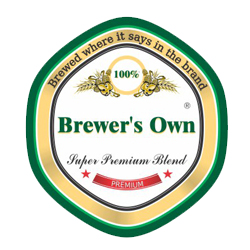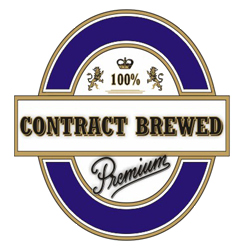
Thoughts on contract brewing
On a visit to Beechworth a couple of years ago* the family managed to spend a little time looking over the very hands-on operation that is Bridge Road Brewers. Arrangements had been made to catch up with owner and brewer, Ben Kraus, and chat about beer in general and Bridge Road specifically.
 “No worries, Prof, happy to give you some time,” said the ever cheery Ben. “Come round about 6am when we’re mashing in.”
“No worries, Prof, happy to give you some time,” said the ever cheery Ben. “Come round about 6am when we’re mashing in.”
“There’s a 6 o’clock in the morning now, is there?” I replied.
Here’s a brief rundown of the two hours spent with Ben that morning.
After twenty minutes or so at the computer replying to emails and sending off various orders, Ben made us both coffee and set to work preparing to brew. The mash was on its way when the ‘O’ ring on the pump used to transfer the wort to the kettle decided it had had its day and Ben set to it with wrench, vigour and a few rude words.
Retry. ‘O’ ring not properly seated. Repeat process.
Retry. ‘O’ ring slipping. Repeat process.
Retry. ‘O’ ring not properly seated. Try different ‘O’ ring. More rude words. ‘O’ ring gets the message. Brew transferred successfully.
“Mate, I guess you can’t just call a plumber at six in the morning. Eh?”
“Not when it was the plumber who I swapped the pump with for some beer. No, not really. Plus, you just learn a little bit about a lot of different trades when you run a brewery.”
 And there’s the thing. As an independent brewer Ben is not just a beer maker. He is a Jack-of-all-trades and a finder & fixer. He is a craftsman but also a small business owner who relies on just himself to get a lot of the work done. He is a bookkeeper and a sales representative and he has to know a bit about tax and superannuation as well as the logistics of the business from sourcing the raw materials to distributing the finished product; which he has to bottle, label, pack and shift.
And there’s the thing. As an independent brewer Ben is not just a beer maker. He is a Jack-of-all-trades and a finder & fixer. He is a craftsman but also a small business owner who relies on just himself to get a lot of the work done. He is a bookkeeper and a sales representative and he has to know a bit about tax and superannuation as well as the logistics of the business from sourcing the raw materials to distributing the finished product; which he has to bottle, label, pack and shift.
In addition he needs to have a good grasp of HR issues and employing, rostering, training and retaining good staff to ensure that his vision is projected on those many occasions when he is out-and-about at beer dinners, festivals, expos and other beer-related events requiring his attendance.
He’s not alone, either. A visit to Mountain Goat Brewery a few years back recalls images of the bloke-in-charge on the working end of a hose cleaning out brew vessels and mopping concrete floors. The scene is repeated over and over again in small to medium sized breweries around the country. From one-man operations to family businesses and small team concerns the story is identical. One minute you’re at the Board Room table, the next you’re in your gumboots and up to your knees in spent malt.
These scenes are illustrated here not to suggest that those who have their beers brewed under contract (in the many forms which that can take) are in any way ‘cheating the system’ or that they are making an inferior product. But ponder this; lots of considerations affect our retail decision making every day. The marketing graduates will tell you all about ‘the decision tree’, a series of subconscious calculations that kick in sometime between ‘needing beer’ and ‘paying for beer’ that ultimately impact on our purchasing.
In terms of purchasing beer, the following factors (in no particular order) are almost universal; price, needs, storage space, occasion, beer style, beer brand, beer label, brewer, emotion. Two or more or all of these help determine which brewer secures your custom at that specific time. Sometimes it’s as simple as a funky name or an eye-catching label. Sometimes it’s the need for hops or the anticipation of some nice stout drinking weather while at other times it’s a case of ‘that fit’s my budget today’.
What the beer companies gain in advantage is that they essentially bypass the initial – and most expensive – stage. Brewing and bottling the beer. What they don’t lose as an advantage is that their beers appear to be exactly the same as those made by brewery brewers. The average consumer sees no difference between a beer made by a brewer and a beer made for a beer seller. And, really, that’s not the worst thing that could happen. The more players there are in the market offering more choices in more outlets and venues the better the beer world is overall.
But it is the issues of labelling and branding that are at the core of this debate. As we have seen there is a fair degree of hard work, long hours and capital investment in brewing good beer in quantity with consistent quality. It takes a lot less to ‘buy’ beer from a contract brewery to simply label and sell as a brand. As long as the consumer can make a considered buying decision based on the facts at hand all is well with the world.
It is only when the contract brewer artificially adds prestige, provenance or any other measure of premium value to the brand that the waters become murky. If someone buys a product because they believe it represents a region or the intentions of its original creator or that it is simply the product of a certain ‘place’ when it is actually not, then something needs to be done. A common theme has been to name or shame, or otherwise unmask, those who are blatantly gaining a commercial and intrinsic advantage from the hard work of others.
An alternative and perhaps more palatable response may be to work from the other direction and highlight the beers that are made where they say they are by whom they say brews them. A simple ‘Brewer’s Own’ addition to the label or ‘Made At (insert brewery name here)’ tag to assist in differentiation may solve the basic problem of ‘implied provenance’ that seems to be at the core of the argument against the contract brewer. It doesn’t denigrate those that are not, but merely identifies those that are.
It would be lovely to think that all brands made by every type of brewing model could sit equally on the shelf and stand or fall on the merits of its taste, flavour, enjoyment and the consumers’ emotional attachment to the brand. It just seems a shame to ignore the extra financial risk, hands-on methods of traditional brewing and hard slog made by those who brew their own beer.
Oh, and the time and effort and ‘O’ rings spent trying to keep all the pumps and what-not running smoothly.
*In the interests of full and frank disclosure, the purpose of the Beechworth holiday was to share the history and charm of the region with the family and not just to spend a large part of each of the four days at Bridge Road Brewers. We even saw some other sights around town, so there.




